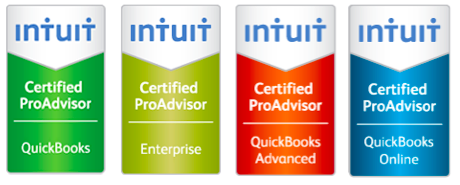How to Choose a Quality Bookkeeping Service in 3 Easy Steps
 There are lots of people and firms who provide bookkeeping services but they are not all created equal. The problem is you can’t test them all out and figure out which ones are good and which aren’t- you have to commit to one and go with it for awhile and even then you may not realize you’ve picked a lemon until months down the road.
There are lots of people and firms who provide bookkeeping services but they are not all created equal. The problem is you can’t test them all out and figure out which ones are good and which aren’t- you have to commit to one and go with it for awhile and even then you may not realize you’ve picked a lemon until months down the road.
So this guide is going to give you three simple steps to evaluate any bookkeeper and pick the best option. Here’s what you look at:
Step One: Evaluate the Price
What?? Price? Am I really telling you that one of the things you should judge a professional service by is price? Well, yes. Because first of all, let’s face it- no one wants to pay a dime more than they have to for a quality service. I am the same way- I don’t want to pay $400 when I could have gotten the equivalent for $200 and the only difference between the two choices was paying an extra $200 for nothing.
So, price definitely matters. But there is a smart way to look at price and then there is just being cheap, which almost always costs more in the long run. Here is how to evaluate bookkeeping prices:
Avoid Hourly Rates
There are a lot of problems with hourly rates for bookkeeping, so right off the bat if you’ve got someone who wants to give you an hourly quote, you can cross them off your list. Let me tell you the reasons for this (unless you don’t care, in which case you can skip on down!)
First, with an hourly quote you never know how much you are going to be paying. I see clients all the time whose bookkeeping started out being three hours, then after a few months it was four and then pretty soon it was six hours a month- but their volume of business was essentially flat. So why did the hours keep changing? Who knows? But you will have no say in the matter.
Second, you and your bookkeeper are working at cross purposes. They make more money by taking more time on your books and you want them done fast. They are incentivized to make things more complicated, although they will often tell you things like “this is how it HAS to be done” to explain their convoluted mess.
 Some of the worst books I’ve ever seen have been done by hourly bookkeepers who took five steps to do something that should have been done in one.
Some of the worst books I’ve ever seen have been done by hourly bookkeepers who took five steps to do something that should have been done in one.
Plus, what if they are slow typers? What if they make a lot of mistakes and they have to go back and fix them? Is that time billable to you?
Third, why CAN’T they tell you how long your books will take? Is it their first time? Are they planning to charge you for the time it takes to ask you for things and the time they wait for them? If they are that unsure about your books that they don’t know how long it will take I’d be worried. If they want to be able to tack on extra fees just because you had a little more business this month does that also mean they will charge less in the slow months? Doubtful.
Fourth, hourly rates are a terrible way to judge how well a job will be done. Some people think bookkeeping should only cost $10-$12 an hour. They are confusing this with data entry. Data entry is just typing stuff in but bookkeeping requires knowing what to type where. I can make a fast hot mess of your books if all I do is type stuff in willy nilly.
For example, if you and I agree that $80 a month for doing your books is fair, does it matter if it takes me one hour or four? If I do a great job, give you quality service and everything you asked for then why does the hourly rate matter? The best bet is to pay for results, not time and then you know exactly what you are getting.
Avoid Package Rates
Some flat rate bookkeeping services offer flat rate packages. These offers will say things like “Any Size Business $135/Month” or they will have fixed price gold, silver and bronze packages, etc.
 This may sound like a good deal, and it is better than paying hourly, but just like with clothes- how often does one size really fit all, or even most?
This may sound like a good deal, and it is better than paying hourly, but just like with clothes- how often does one size really fit all, or even most?
What you quickly find out with these plans is they fall into one of two things. Either the clients they accept must fit into a very narrow range of parameters of what they will do and what they will get, or else the service will be poor for most clients.
Just ask yourself, how can two businesses, one with only one checking account and a couple dozen transactions a month possibly be paying the same fixed rate as a business with three checking accounts, two credit cards, two loans, payroll and inventory to manage? One, or more likely both of them, are getting screwed. The small business is overpaying and the big business is getting cut rate service in order for the math to work at the low rate they are paying for the service.
The Right Choice: Custom Quoted Flat Rate Pricing
Your outsourced bookkeeping service should be giving you a flat rate custom quote. They should evaluate your situation in detail, work with you to determine what you need and what you want and then provide a flat rate quote that is specific to your exact situation. Yes, it is just that easy.
That is what you should expect and anyone not offering that level of service and price stability for your business is going to be very easy to skip over.
Step Two: Evaluate the Firm
Who you are going to do business with is extremely important. They are going to have access to your financial information and you are going to rely on them to provide financial reports for you that will be the basis of business decisions, tax payments and government records. You don’t want it to get screwed up, lost, forgotten about, left undone or handed off to some unknown third party who may or may not be in the country.
Here’s what to look for and avoid in bookkeeping firms:
Avoid the One Man or One Woman Shop
Nothing against the solopreneur but I get calls every week that go like this: “I had a woman who did my books for the last six months but she stopped answering the phone and I can’t get in touch with her and now we are three months behind.”
The problem with the one person bookkeeping service is that they work from home and are the most subject to inconsistency and sudden disappearance. I’ve heard of clients being dropped because of all the following reasons, and I’m sure there are many more: moved, went back to school, got a full time job, got hired by a client, got divorced, got pregnant, got busted for stealing (oops!), graduated from school, got sick, went traveling, got burned out and just plain left without a trace.
When you hand things off to a single individual you are never sure if they will still be in business next week or next month. They have no rent to make, no payroll and no real ties to continue serving the handful of clients they may have so it is easy for them to drop off the face of the earth.
As a side note, but an important one, the solo bookkeeper is also the one least likely to be up on current technology, have processes and procedures in place, will want to come and work at your location and will not have anyone to check with about questions on accounting topics they may not be totally familiar with to begin with. They are also the least likely to have deep or broad experience in various industries and often no specific education in finance or accounting beyond a working knowledge of QuickBooks.
And they often aren’t even the cheapest option, to offset many of their other downsides! They are the most likely to charge by the hour and because they are trying to make a living off just a few clients either the rates will be high or the hours long, or both, relative to what other options will cost.
Avoid CPA Firms
There is nothing wrong with CPA firms for what they are good at but very few of them are set up well to do bookkeeping. Large firms will have some bookkeepers on staff to help clients whose books are a mess or who don’t have bookkeepers and these people are often good and know what they are doing. The problem is they get billed out by the hour (bad) and at typically really high rates (worse!). Some firms bill between $100 and $150 an hour for their bookkeeping! Sure, the books are done right but at a huge and unnecessary cost!
Small CPA firms are a little less expensive, but their bookkeeping person is often also a tax person, so at tax time you might find your books getting way behind. They may also not be the most up to speed bookkeeper, because they are doing double duty and often it is something they picked up (and many dread) rather than what they trained to do full time. And small CPA firm rates often aren’t much lower than big firm rates and they too almost always charge by the hour.
The other issue with CPA firms that is very often true is that they are not very customer service focused. It can often take a long time to get a call back or a question answered and when you do it sometimes feels like they consider you to be kind of a nuisance. I don’t really understand it, since they are in a service business that most people view as a commodity- you’d think they would be knocking themselves out trying to provide great service but that’s not usually the case.
And when you do have questions you can normally expect to be billed for the time it takes to get an answer.
Avoid Going Offshore
I have had a lot of luck using overseas workers to help me out with projects including writing software code, designing websites, writing articles and doing SEO work. I’ve also had some terrible experiences with using overseas workers for those kinds of projects. Fortunately, none of them have been mission critical and even in the worst cases I wasn’t out much money.
 There are definitely some advantages to using people outside the US to help you with various business tasks, the biggest one being price. If you can explain very clearly what you want and you are patient and you find someone who is also a good honest hard worker looking to do a good job you can get wonderful results.
There are definitely some advantages to using people outside the US to help you with various business tasks, the biggest one being price. If you can explain very clearly what you want and you are patient and you find someone who is also a good honest hard worker looking to do a good job you can get wonderful results.
The drawbacks are equally significant. The number one issue is communication. What you think is obvious or that you have explained clearly often looks like gibberish to the other side- at least that’s what you have to conclude with the results you sometimes get. And trying to clear it up can be an endless stream of back and forth with both sides becoming more frustrated and progress going nowhere. And this assumes you are conversant enough that you can give good direction and provide feedback so they can get what you want done right.
The second big drawback is you have no recourse and no real leverage if anything does go wrong. You may be able to get your money back if you paid via a credit card, but you can’t recover the lost time or the potential data loss or other complications of giving sensitive financial information to someone with no accountability to any legal system.
I am not saying there are no good offshore solutions for accounting or that US based firms are all perfect. But for a small firm the hassle of trying to overcome the communications issue and the risk of dealing with someone with no legal recourse is going to be way beyond the benefit of any minor cost savings you might realize.
The Right Choice: A Dedicated Bookkeeping Services Firm With Great Reviews
The best choice is a US based firm that specializes in outsourced bookkeeping and is staffed by a group of experienced and knowledgeable bookkeepers. That way, you can be much more certain your work will be done consistently each month, the communication will be easy and you have options and recourse if anything ever does go wrong. It also means the business is a lot likely to still be in business and taking care of you six months from now, a year from now and so on.
It also means they are going to answer the phone when you call and respond to emails (they better! or cross them off the list) in a timely manner- the same day usually. By choosing a firm it also means you are more likely to find they have experience with your kind of business and are familiar with your industry. They will have the size needed to be able to invest in the latest technology, continuing education and the tools needed to do a great job with your books.
You also want a firm that has happy clients! Ideally one where the clients have posted reviews and are willingly promoting and referring the business to their colleagues and friends. You want to see a growing list of glowing reviews which means the firm is taking good care of its current clients and adding to the group on a continual basis. This is the best indication you’ve found the right firm for your business as well.
Step Three: Evaluate the Process
The final piece of the puzzle is how well the process is going to work for you. Not every method is going to be a good fit for every business and some firms don’t have much (or any) flexibility in the way they do things. Here’s what to look for:
Avoid Someone Who Wants to Come to Your Office
This is the old school style of bookkeeping and it’s not good for a few reasons.
First, it is always slower to work in someone else’s office because very often the one the bookkeeper gets it the slow computer with the weird keyboard and the small monitor and the wonky internet connection. You are paying more for this you just may not realize it.
 Second, pretty soon either the bookkeeper or you is going to have to reschedule and then who pays for the lost time and change of plans? And the work doesn’t get done.
Second, pretty soon either the bookkeeper or you is going to have to reschedule and then who pays for the lost time and change of plans? And the work doesn’t get done.
Third, someone who is willing to come and sit in your office is most likely a solo bookkeeper and most likely charges by the hour, which are already both bad signs.
Fourth, someone in your office who does your books is a lot more able to steal than someone off site with no access to check stock or live account passwords, live checks, etc.
If you want someone who does the books but also answers the phone, makes coffee, does some filing and cuts checks in the office then outsourced bookkeeping might not be the right fit. But consider this- the person who will do those things is very often also not well trained or familiar with bookkeeping.
What you might want to consider instead- and we’ve had a lot of success with this approach- is we can train the in office person to do a few of the tasks that are hard to take off site and then we do the rest of the skilled bookkeeping as we normally would. This gives you the best of both worlds- the in office tasks are handled and you get high quality professional bookkeeping on a consistent basis for a great price.
Then if the office person changes, moves, gets fired, whatever- the books are still consistent and no time is lost. The new person, when they get found, simply gets trained the same way and the books still get done the same way. And, you have an outside third party reviewing the books who can spot any red flag activity that an in house person can conceal if they are both handling the funds and doing the books.
Avoid Someone Who Wants You to Scan or Mail All Receipts
 I’m not sure why some firms or individuals are still doing this but it doesn’t make a lot of sense- and it certainly creates a lot of work for you!
I’m not sure why some firms or individuals are still doing this but it doesn’t make a lot of sense- and it certainly creates a lot of work for you!
Individual transactions are entered in the books, but they almost always come from the bank and credit card statements, not the paper receipts you get as you go through your day. You should keep those in a file, yes, but your bookkeeper does not need them to do their job. If you spend cash, then yes, the bookkeeper needs the details on what it was spent on, but that is a far cry from send me everything.
There are much better, simpler and easier ways to transfer information that make it super easy on the client to hand off what’s needed. If your potential bookkeeper doesn’t know how to do that, skip over them immediately!
Avoid Anyone Who Won’t Let You Have or Access Your Own QuickBooks File
I’ve had numerous clients over the year who have wanted to switch to us and then found out their current bookkeeper either won’t give them their file or won’t give them access to their online account. In some cases we were able to work around it and in some cases they lost a lot of historical information they had paid for and should have owned!
If your bookkeeper is trying to keep you as a client by holding your information hostage you have found a true loser! Ask up front if you can have the file any time you want it (assuming it doesn’t already reside on your computer) or if they are using an online account make sure you are going to be the master administrator. Accept nothing less. After all, you are paying them to create the data- you should own it.
Avoid Anyone Using Non Standard Bookkeeping Software
 The lion’s share of small business bookkeeping service today is done on Intuit’s QuickBooks. This software has its quirks, and it isn’t always perfect, but it is far and away the market leader. That means that when you go to have your taxes done, the tax person is going to expect to see QuickBooks. So will your bank. And so will most of the people who work in your office if they’ve had other office jobs.
The lion’s share of small business bookkeeping service today is done on Intuit’s QuickBooks. This software has its quirks, and it isn’t always perfect, but it is far and away the market leader. That means that when you go to have your taxes done, the tax person is going to expect to see QuickBooks. So will your bank. And so will most of the people who work in your office if they’ve had other office jobs.
QuickBooks comes in desktop versions and online versions. A bookkeeping firm should be able to handle either and from any year from the present back to about 2012. Beyond that they should be telling you to upgrade. If your bookkeeper tells you the 2006 version of QuickBooks is just fine, they should get tossed out immediately. Software ages poorly and using anything that old is a recipe for disaster. The fact that they don’t know that is worrying.
Xero is coming up in the world and while I don’t like it as much as QuickBooks, it is an acceptable substitute. Your CPA won’t know how to use it most likely, but they can work from the reports.
Anything else is a big red flag. If your bookkeeper wants to use Quicken, Excel, Microsoft Money, Peachtree or something else to do your books, watch out.
The Right Choice: A Painless Tech-Forward Process for Two Way Information Flow
In my opinion it is part of the bookkeeping service job to make getting information from the client and giving it back to them as painless and non intrusive as possible. For each client we evaluate what is needed and how best we can access it and we get that set up right away so we can then focus on doing the job without constantly bothering the client for information or asking them to send over more and more paperwork.
If the process can’t be simply explained and if it isn’t set up to work seamlessly then you probably haven’t found the right provider yet.
Conclusion: The Right Bookkeeping Service Firm
To recap the discussion, the right bookkeeping firm is going to be easy to identify by looking at these three things:
- The price is right- a custom quoted fixed flat rate that is a great price for quality results with the deliverables clearly spelled out in writing and provided on a consistent and timely basis
- The firm is right- a dedicated bookkeeping business with a tech savvy staff of experts who make the process painless and are super customer service oriented
- The process is right- it fits your needs and delivers a high quality result with minimal interference to your running your business
Of course I am biased, but I think we’ve done a great job at CapForge Bookkeeping meeting all of the above requirements. I’d be thrilled if you gave us a call so we can discuss your needs and give you a custom quote (naturally!) for your bookkeeping work!




